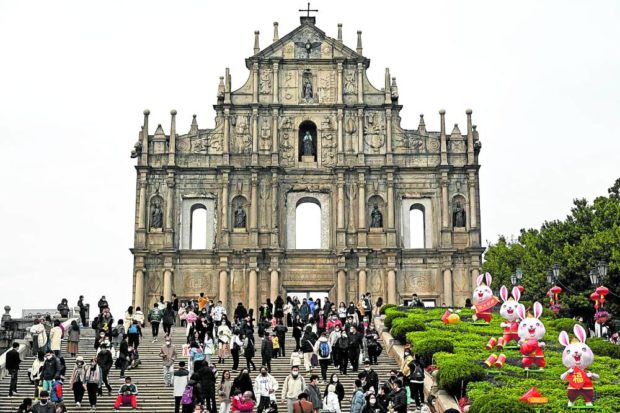
TOURIST SPOT | Visitors from mainland China flock to the Ruins of Saint Paul’s in the southern Chinese enclave of Macau in this photo taken on Jan. 17, 2023. (Agence France-Presse)
MACAU — Macau’s streets were packed in the run-up to the Lunar New Year after pandemic controls were abruptly lifted but it is far from business as usual as the Chinese casino hub wrestles with questions about its future.
Mainland Chinese tourists filled winding passages leading up to the historic Ruins of Saint Paul’s, and stores selling local snacks like almond cookies and meat jerky had trouble keeping up.
“We don’t have enough goods for this Lunar New Year as we didn’t expect this,” a business owner surnamed Li told Agence France-Press (AFP).
Tourists may now be back, but Beijing wants the former Portuguese colony to diversify its casinos-reliant economy.
President Xi Jinping has led a years-long anticorruption campaign that clamped down on money laundering and gambling.
Yet quitting gambling — and the huge tax revenues casinos generate — will be a hard habit to break.
“The government has an inherent conflict,” gaming consultant David Green told AFP. “It needs to be seen by the central government to be promoting nongaming, but… it has to be cognizant of maintaining its revenue stream.”
The city of some 700,000 is the only place in China where casinos operate legally and for years has relied on mainland Chinese gamblers as its economic lifeline.
Last year Macau saw gaming revenues plunge to a record low of 42 billion patacas ($5.2 billion) after the government shut down most businesses at the height of a coronavirus wave.
Old ways
Macau issues just six operating concessions for a multibillion-dollar industry that, until the pandemic hit, generated six times the gaming revenue of Las Vegas.
In December, the government awarded new decade-long concessions to all incumbents, effectively keeping the status quo but adding new requirements for nongaming investment.
The firms have since pledged a total of $14.9 billion on projects including theme parks, convention and exhibition centers, fine dining and performance venues.
Former lawmaker Sulu Sou said it was “a step forward” for Macau to set clear demands for diversification.
“Changes in the industry and shifting attitudes toward gambling in mainland China forced the [Macau] government to spell these requirements out in black and white,” he told AFP.
Sou pointed to the downfall of “junket king” Alvin Chau, who was sentenced to 18 years in jail last week for hosting illegal gambling on a vast scale.
“It was a major signal to society that even as we return to normality, we can’t use the old ways to make a fortune anymore,” Sou said.
Last month, Macau dismantled most of its pandemic controls and reopened its borders, following Beijing’’s abrupt decision to abandon its signature zero-COVID policy.
For residents like pharmacist Mariana Soares, the reopening capped off nearly three years of anxiety and economic doldrums — but it also came with a sense of whiplash.
“It’s a shock to the system,” she told AFP. “Suddenly everyone is coming in and it’s like whatever happened before had been erased.”

